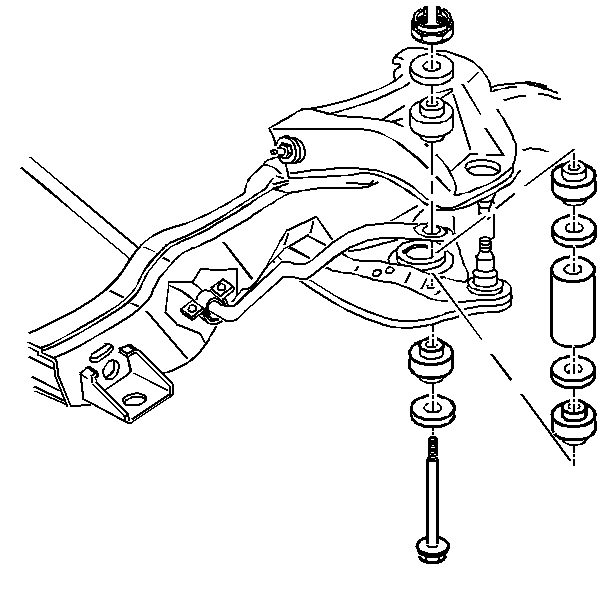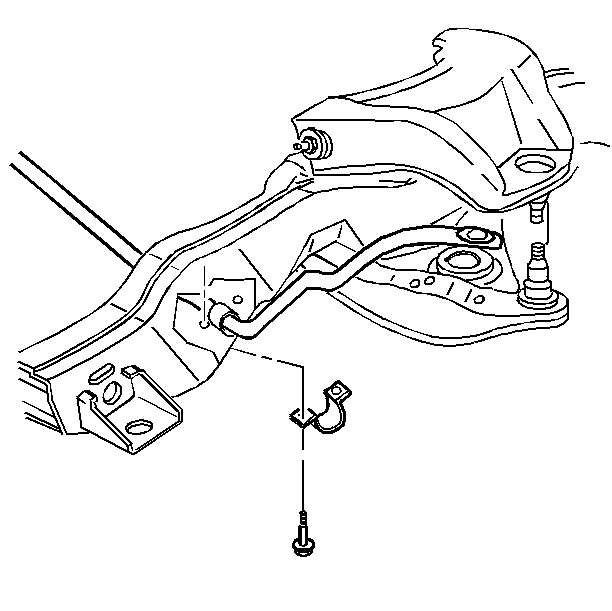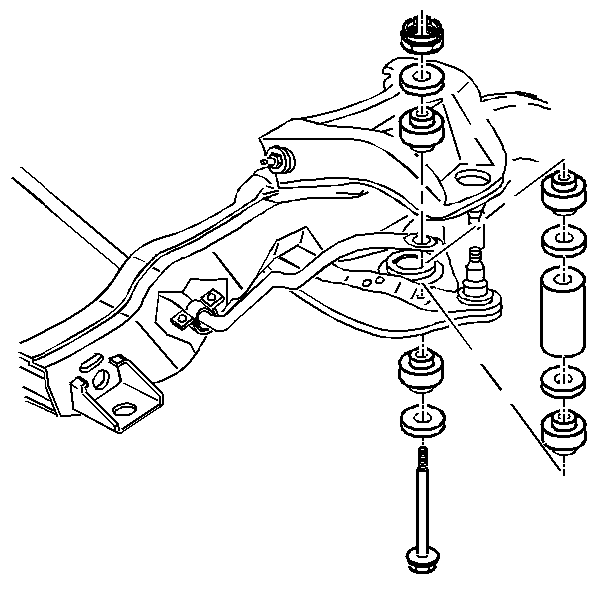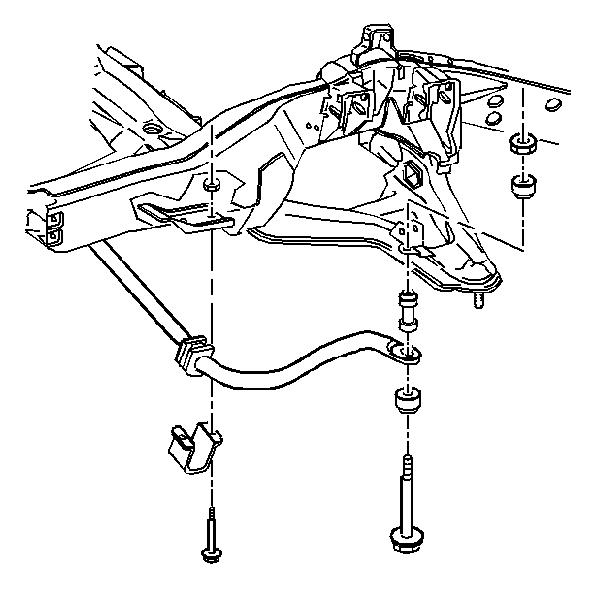Stabilizer Shaft Replacement RWD
Removal Procedure
- Raise and suitably support the vehicle with safety stands. Refer
to
Lifting and Jacking the Vehicle
in General Information.
- Remove the tire and wheel assembly. Refer to
Tire and Wheel Removal and Installation
in Tires
and Wheels.
Important: When you remove parts from the right side and the left side of the vehicle,
keep the parts separated.
- Remove the link bolt nuts.
- Remove the retainers from the link bolts.
- Remove the grommets from the link bolts.

- Remove the following parts
from the link bolts:

- Remove the stabilizer
shaft bracket bolts.
- Remove the stabilizer shaft brackets.
- Remove the stabilizer shaft.
- Remove rubber bushings from stabilizer shaft.
- Inspect all of the parts for wear and damage.
Installation Procedure

- Install the rubber bushings
to the stabilizer shaft with the slits facing the front of the vehicle.
- Install the stabilizer shaft.
- Install the stabilizer shaft brackets over the bushings.
Notice: Use the correct fastener in the correct location. Replacement fasteners
must be the correct part number for that application. Fasteners requiring
replacement or fasteners requiring the use of thread locking compound or sealant
are identified in the service procedure. Do not use paints, lubricants, or
corrosion inhibitors on fasteners or fastener joint surfaces unless specified.
These coatings affect fastener torque and joint clamping force and may damage
the fastener. Use the correct tightening sequence and specifications when
installing fasteners in order to avoid damage to parts and systems.
- Install the stabilizer
shaft bracket bolts.
Tighten
Tighten the stabilizer shaft bracket bolts 36 N·m (26 lb ft).

- Install the retainers
and the grommets to the link bolts. Position the parts correctly.
- Install the link bolts through the lower control arm hole. Stack
the parts in the following order:
- Install the link bolts through the upper control arm hole.
- Install the grommets.
- Install the retainers.
- Install the nuts to the link bolts until the nuts meet the end
of the bolt threads.
Tighten
Tighten the link nuts to 18 N·m (13 lb ft).
- Install the tire and wheel assembly. Refer to
Tire and Wheel Removal and Installation
in Tires
and Wheels.
- Lower the vehicle.
Stabilizer Shaft Replacement 4WD
Removal Procedure
- Raise and suitably support the vehicle with safety stands. Refer
to
Lifting and Jacking the Vehicle
in General Information.
- Remove the tire and wheel. Refer to
Tire and Wheel Removal and Installation
in Tires and Wheels.

Important: Remove the parts from the right front and the left front of the vehicle.
Keep the parts separated.
- Remove the link bolt nut.
- Remove the insulator.
- Remove the link bolt from the lower control arm.
- Remove the spacer.
- Remove the insulator.
- Remove the stabilizer shaft bracket bolts.
- Remove the stabilizer shaft brackets.
- Remove the stabilizer shaft.
- Remove the stabilizer shaft rubber bushings.
- Inspect all of the parts for wear or damage.
Installation Procedure

- Install the insulators
to the stabilizer shaft. Face the slit in the insulator forward.
- Install the stabilizer shaft to the frame and to the lower control
arm.
- Install the brackets to the rubber bushings.
Notice: Use the correct fastener in the correct location. Replacement fasteners
must be the correct part number for that application. Fasteners requiring
replacement or fasteners requiring the use of thread locking compound or sealant
are identified in the service procedure. Do not use paints, lubricants, or
corrosion inhibitors on fasteners or fastener joint surfaces unless specified.
These coatings affect fastener torque and joint clamping force and may damage
the fastener. Use the correct tightening sequence and specifications when
installing fasteners in order to avoid damage to parts and systems.
- Install the stabilizer
shaft bracket bolts.
Tighten
Tighten the stabilizer shaft bracket bolts to 65 N·m (48 lb ft).
- Install the insulator to the link bolt.
- Install the link bolt through the stabilizer bolt holes.
- Install the spacer.
- Install the link bolt through the lower control arm with the parts
stacked properly.
- Install the insulator.
- Install the link bolt nut.
Tighten
Tighten the link bolt nut to 15 N·m (11 lb ft).
- Remove the tire and wheel. Refer to
Tire and Wheel Removal and Installation
in Tires and Wheels.
- Lower the vehicle.






